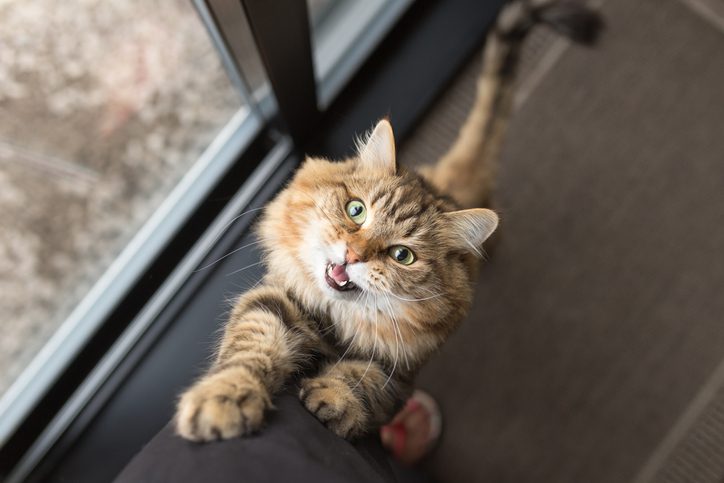Why is My Cat Meowing Excessively in Limerick, PA?
Do you have a cat who meows a lot? Do you sometimes wonder if anything could be wrong with them to cause this behavior? If so, you’ve come to the right place.
In the article below, you’ll find out some of the most common reasons why cats might meow excessively. Some of these causes are harmless and others are more serious, so it’s important to get to the bottom of the issue and help your cat recover if they are dealing with an underlying health problem.

Greeting
Does your cat meow at you a lot when you first come home from a day at work? If so, they may be greeting you with excessive meows. Meowing upon greeting is not uncommon for cats. Some may offer long, drawn out meows when you get home, and others may chirp or trill at you instead.
Cats who meow in greeting are perfectly normal, and this behavior is nothing to be worried about. Make sure your cat isn’t showing any signs of pain or illness, but otherwise, they are likely fine in this situation.
Affection
Some cats are much more affectionate than others. Cats who love being around their owners may sometimes meow and chirp while interacting with their human family members because they want to display some of that affection. If your cat meows at you while you while playing together or meows for you to pet them during your cuddle time, your cat may be doing so out of affection.
Look at the rest of your cat’s body language to let you know whether this is meowing out of affection. If their tail is held high and ears forward, they are likely not in pain or afraid, and is probably meowing affectionately instead.
Begging
Sometimes, cats may meow excessively when they’re begging for something—especially food or treats. Even the quietest of cats may be prone to meowing a lot when they want to be fed. If your cat starts meowing frequently around mealtime, or if they follow you with tail held high while meowing at you, these are all signs of begging.
Make sure your cat is getting enough food, but don’t overfeed them. Even if your cat begs, they don’t need to be fed too much, for risk becoming overweight and developing diabetes or heart disease.
Anxiety
If your cat is very anxious or afraid, they might meow to let you know this. Cats who meow out of anxiety or fear are more likely to do so if they’re looking for their human family members to provide some comfort to them.
Look at your cat’s body language to see if they are showing signs of anxiety. Is your cat hunched or hiding in a corner, or keeping their ears close against their head and tail between legs? These are signs that can all show cat anxiety.
Pain
Cats in pain may also meow excessively. However, the type of meowing your cat may perform when in pain is much different than meowing associated with greeting, begging, or affection. Your cat may yowl or howl when in pain or may have a weak and strained voice instead.
If your cat is in so much pain they are crying, it is best to see a veterinarian right away. Look for other symptoms and consider whether an emergency vet visit might be in order.
Normal Behavior
Finally, cats may meow excessively just because it is part of their personalities. Some cats are naturally a lot more talkative than others, and you may just have a cat who likes to make themselves heard. This is completely normal and is no cause for concern.
If you aren’t sure what’s causing your cat to meow so much and you haven’t had them very long, they may just be showing their personality. However, if your cat suddenly starts meowing excessively after you’ve had them for several years, this may not be a normal behavior.
Call Limerick Veterinary Hospital to Talk with a Vet
As you can see, many of the causes of excessive meowing in cats are nothing to worry about. However, some of them are a lot more serious and may require veterinary care, so it’s a good idea to consider the other symptoms your cat might be showing as well.
If you think there is anything serious going on with your cat, or if you’re just not sure, talk with your veterinarian. The vet can do blood work and perform other tests to see if there is any cause for concern. Although you may just have a talkative cat, it’s a good idea to rule out other possibilities.
Call (610) 489-2848 or use the online form to talk with a Limerick Veterinary Hospital veterinarian about your cat’s meowing!
